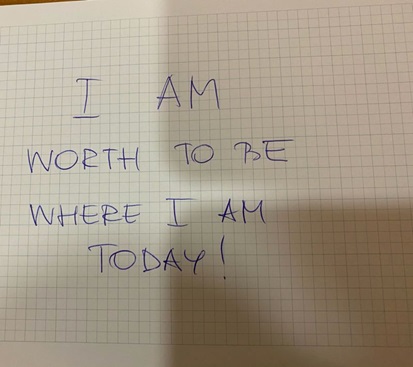- Home
- Resource Center
- Articles & Videos
- The Boardroom Beat #3
11 May 2021
| by i3 Coaching
The Boardroom Beat #3
The Boardroom Beat celebrates curiosity. The Monthly format is Q&A&Q:
• Question from a GALA member or staff
• Answer based on experience, case study, best practice, or innovation
• Question(s) back to push customized thinking
Question: Why did attendees connect so strongly with the Imposter Syndrome session at GALA Connected 2021?
Answer: Colleagues were reassured that they are not alone. The KnowledgeFest session normalized Imposter Syndrome. Candid small group discussions ensued.
Questions: How did it feel to realize that 4 out of 5 others “in the room” also experience Imposter Syndrome? What did you learn about yourself? How is that actionable?
79% of those polled reported experiencing some level of Imposter Syndrome. This supports published research that 70% of individuals will experience Imposter Syndrome at work. Even if the percentages were skewed upwards by session opt in, the raw numbers support an i3
Coaching 2020 observation that the number of clients dealing with Imposter Syndrome spiked during COVID. Here are some learning highlights:
• Correlating factors are a drive for high performance, competitive business cultures, and new challenges. Add isolation during COVID from usual support systems, and 2020 and was a perfect Imposter storm.
• Imposter Syndrome is fear/feelings based. It is often a departure from the analytical approach professionals use to make other judgments and decisions.
• There is power in recognizing that an inner voice which suggests “Imposter” is actually friend not foe. The friend attempts to protect us from risk and failure. But that voice (whom many named in a group exercise) does not recognize how much we have grown and of how much we are capable. Nor does it grasp our ability to learn and thrive through failure.
Attendees applied this learning to disrupt old ways of thinking and to activate new ways of doing. Actions:
1. Distinguish between discernment and fear.
2. Record evidence to track and celebrate success.
3. Say “yes” to opportunities.
4. Embrace imperfection.
5. Talk to someone you trust.
Indré Lelevičiené has done all of these things. In 2020 she became the CEO of UAB Baltijos vertimai in Lithuania. She graciously allowed me to share her story.
The Imposter Syndrome that Indré faces has deep roots. She grew up in an environment of cultural oppression in the Soviet Union where it was advisable not to stand out. It was more safe to “stay in a cage.” She was trained to excel at basketball, and she dedicated thirteen years to that path prescribed for her. But Indré loves language, and her dream since childhood was to be a translator. When she left basketball behind she surprised most, disappointed some, and often doubted herself. Now she rejoices that “I am out of the cage.” She loves business, networking, and leading people. She is a mentor. Still today, the inner voice she named “Mimosa” appears occasionally to caution and to worry her. Mimosa says she should not show off. Mimosa reminds that because she is not a native English speaker she may embarrass herself if she speaks up with a question at a conference. Mimosa even dares to suggest that others look up to her only because, well, they literally look up. At 180 centimeters Indré is an imposing figure.
But Indré has evidence that her inner voice Mimosa is misguided. She knows that her success is based on hard work, intelligence, and compassion. She overcame her fear of speaking in English and presented at the ELIA conference in Barcelona two years ago. She submitted her candidacy as a Director at ELIA for which voting is now open. In our session she pondered the invitation to speak on the topic of personal branding at UTICamp in Ukraine in July. YES she will do it! Every time she accepts a new challenge she models for her two sons that new adventures are worth the risk. I suggest that her circle of influence is far greater than she realizes. Indré’s courage, transparency, and aplomb if she stumbles are an inspiration that extend beyond her family.
Good news: Clients typically get traction quickly in addressing and conquering Imposter Syndrome. “The voice” may not be forever eradicated, but it loses power and influence. GALA members should know that what they did together at KnowledgeFest was extraordinary. It is unprecedented that such a large group would discuss the sensitive topic of Imposter Syndrome. The candor and courage was a function of a culture of transparency and support that GALA has fostered for it members. At the end of the session the group shared “I AM” statements. Indré posted hers on LinkedIn.

Shelly Priebe
Since 2010 Shelly has consulted and coached companies of all shapes and sizes, ever finding herself in the midst of disruption. In 2018 she was on the core team of a start up tech company on mission to address the disturbing trend toward digital isolation. These days she finds herself fueling a (R)evolution with corporate clients dedicated to the democratization of coaching, an inclusive initiative intended to diversify the face of tomorrow's leaders. She was the co-chair for the 2020 ATX Global Leadership Summit. Shelly delivers iPEC's Core Energy Coaching™ methodology to create awareness and shifts in the energy that feeds thoughts, emotions, and actions. She is certified in Insights Discovery™ and Energy Leadership Initiative™ assessments. In 2020 Shelly elevated her “inner introvert” and relished more time in her Tree House office overlooking Lake Austin. Her dogs rejoice that their daily trail runs are not interrupted by her travel. While she wears many hats, “Mom” of four age range 13 to 26 is her favorite.


